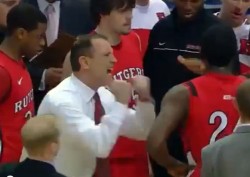
Rutgers Scarlet Knight Players Learn From Passion NOT Abuse
Since the Rutger Scarlet Knights coach is being so pillared in the press lately, Craig, the Mental Toughness Trainer wanted to weigh on how coaches can lead with passion – not abuse!
It is also important you keep a vigilant watch that your kids are never subjected to that kind of abuse…
Recently Craig, the Mental Toughness Trainer was interviewed for an upcoming article in Consumer Affairs about the Rutgers coaching scandal. We thought his answers would be helpful…
What do you believe is the biggest lesson parents should take from the Rutgers coaching scandal?
Parents need to get the lesson that this kind of derogatory behavior happens at all levels of sports and that they need to ask their kids directly if they have experienced it and immediately take action if they have.
Too many parents bury their head in the sand thinking it will get better or that “It’s toughening him/her up for the real world.” I work daily with kids who have experienced this kind of emotional abuse and it affects them tremendously.
To be sure, some kids are not affected and handle such coaches just fine, but you can’t know until well down the road if your kid is one of those or not. Parents also sometime make the logical mistake of thinking that a tough coach/parent worked for them and so it should be good for their kid just the same.
Kids are not miniature versions of their parents; they are unique individuals with a completely different makeup than anyone else.
What are some of the not so obvious signs of a bad coach that some parents might miss?
When a coach shows bias toward the better players with regards to praise and encouragement. A smart coach works to boost up his weakest players.
A coach should never show with words or body language, approval or disapproval based on performance and neither should parents for that matter. Kids need to know they are OK and supported whether they perform well or not.
Some coaches that deal with older kids have been known to be a bit aggressive and use yelling and screaming to get their instructions across. Should parents always avoid sending their kids to coaches who use this technique? Don’t coaches have to be a little bit tough?
Coaches can be aggressive, loud and tough and be very effective without being emotionally abusive.
For example…an abusive coach tears down a player with yelling and screaming.
A coach interested in getting more effort and attention from a player could yell or scream or be aggressive with words like these:
“Jones, I know you are a great player and you are so close to your greatness and I know you want to see that….”
“There is more hustle in you right now than your giving…show the team how bad you want your success”
“Your competition is working harder than you right now, you’ve got to ask yourself if you’re willing to give it everything you’ve got or you want to do this half way and let somebody else take your place because they go the extra mile. Hard work, effort, learning, paying attention will always pay off in more playing time on this team.”
It’s totally fine for a coach to be passionate and raise a voice if that’s the style. It’s the intention behind the yelling and screaming that matters. Coaches will get more out of their athletes by inspiring them than tearing them down.
Famous coach John Wooden said about yelling:
I never yelled at my players much. That would have been artificial stimulation, which doesn’t last very long. I think it’s like love and passion. Passion won’t last as long as love. When you are dependent on passion, you need more and more of it to make it work. It’s the same with yelling.” — John Wooden
What are some of the attributes of a good coach?
Athletes have told me consistently that knowledge of the game gains their respect, but I would say that should be a given. I believe “flexibility” is the most important attribute of a coach. Meaning, one-size-fits all coaching for every player ends up wasting talent. Each player is different and responds to different motivation.
The best coaches learn about people and continually seek to understand the personalities of the players. They know that the athlete isn’t just a sports machine and what happens to them off the court or field affects their play on the field. A great coach supports the player in all areas of performance.
How can a parent give tips to their child on a sport without interfering with what the coach is teaching?
I write a lot about this in my FREE EBOOK:
“The 10 Commandments For A Great Sports Parent” that people can get by going to sportsmentaltoughness.com.
Basically, parents need to ASK the child if he or she would like some suggestions and WHEN they would like them. When giving suggestions and tips, the parent should just ask the child if this is any different than what the coach teaches and how it’s different.
The parent can certainly go to the coach and ask about their methodology and philosophy. Then make a decision on whether or not to go forward.
There are plenty of coaches teaching methods that don’t work for every athlete and it’s the parent’s right to decide what they want their child to learn. Parents need to be in charge of their child’s upbringing but also need to be self-aware that they don’t have all the answers either.
In other words make informed decisions about your child’s sports participation and don’t just assume you know best without knowing all of the facts.
 Craig Sigl is the creator of 6 mental game training programs for athletes sold in 28 countries.His newsletters go to over 18,000 athletes, parents and coaches worldwide.
Craig Sigl is the creator of 6 mental game training programs for athletes sold in 28 countries.His newsletters go to over 18,000 athletes, parents and coaches worldwide.
He has been featured on NBC TV’s “Evening Magazine” show, numerous radio shows and the Seattle P.I. newspaper for his work with youth athletes.
